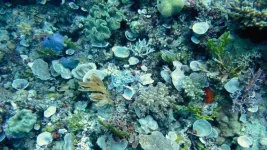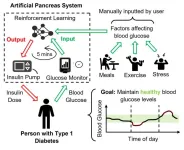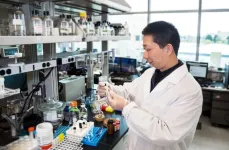(Press-News.org) The climate crisis is turning the temperature up all over the world, but in southern Africa, the rise has been particularly concerning. Wild animals dependent on delicate ecosystems which are already dry, so that food and water scarcity limits their ability to cope with increased heat, are at serious risk. Scientists studied the behavior of three different species of antelope with overlapping ranges in Namibia to try to understand how animals of different sizes and behaviors adapt to the heat.
“Even the indigenous wildlife, adapted to hot and arid conditions, shows sensitivity to extreme heat,” said Paul Berry of the University of Potsdam, lead author of the study in Frontiers in Ecology and Evolution. “We need to consider the possibility that additional anthropogenic influences such as habitat fragmentation may compound the effect of rising temperatures.”
Tackling thermal stress
Animals can respond to high heat in several different ways, including genetic change, migration, and behavior changes, but the most flexible response is changing their behavior. Animals may move into cooler areas within their territories or change their posture, change their times of activity or the amount of activity they do, pant or decrease their energy intake. All these ways of countering heat stress impose physical costs and have limitations, but we can’t understand the trade-offs without first understanding how animals use them.
The team studied three species of antelope: small springbok, medium-sized kudu, and large eland. Springbok prefer open habitats and are highly mobile, while kudu favor woodland and travel less. Eland are also relatively mobile, occurring in a broad range of habits, and like springbok they are largely independent of water provided that there is sufficient moisture in their food. The scientists fitted adult animals with collars containing accelerometers that measured their movements in the hottest periods of the year between 2019 and 2021. They cross-referenced this data with measurements recorded by a local weather station and maps that track the temperatures across the different species’ ranges.
Springbok most affected
The hotter temperatures affected springbok activity most. Increased heat led to a decline in activity, as they moved less during the day and did not compensate with more nighttime activity. Eland did shift their activity from daytime to nighttime, but were generally less affected, perhaps because they don’t forage in open, exposed areas as much as springbok do. Kudu activity changed very little: they usually prefer the shade and are less mobile than either of the other species. Eland and kudu are also larger, and besides being less affected by predation risk because they are more difficult to hunt, may be able to absorb a greater heat rise before being seriously affected by thermal stress.
“While we showed how antelope differ in their response to extreme heat, it would be insightful to know also how they change their behavior,” said Berry. “We intend to use machine learning models to classify behavior, such as feeding, resting, and movement, based on accelerometer data that has been mapped to behavior by direct observation.”
The scientists also hypothesized that other animals’ heat response could be similarly affected by these body size and habitat preference factors, but more research will be needed to determine this. As heat stress that isn’t lethal can still affect the health and reproductive fitness of an animal population, the authors warned that increased heat stress could lead to changes in the ecosystem, with significant consequences for the local area.
“Managing the land both in an economically viable and an ecologically sustainable way is a complex task with far-reaching implications for the social and economic welfare of the region's inhabitants,” said Dr Niels Blaum of the University of Potsdam, senior author of the study. “Deepening our understanding of arid savanna ecosystems is therefore so important.”
END
How antelopes under threat from the climate crisis have responded to rising temperatures
Scientists tracked the activity levels of different southern African antelopes to understand how they handle higher heat on a warming planet
2023-06-15
ELSE PRESS RELEASES FROM THIS DATE:
Dialogues across language and culture
2023-06-15
Teacher talk seems intuitive – the expert imparts knowledge onto novices, who passively receive expertise like a car or machine receives parts at every station on an assembly line. In reality, an effective teacher in an era of dynamic and higher literacies is less of a factory worker and more of an active negotiator who tries to understand where their students are coming from in order to reach them. The language classroom amplifies this challenge where the negotiation not only centers on the knowledge itself but the means of communication for that knowledge. ...
Access to financial services linked to lower COVID mortality rates
2023-06-15
New research shows that some of the best tools to decrease COVID-19 mortality rates weren’t found in the ER, but rather at the bank.
A study of COVID-19 mortality rates across 142 nations has demonstrated a surprisingly strong link between access to formal financial services and lower COVID-19 mortality rates. In fact, it’s proved to be as strong a predictor of lower COVID-19 death rates as several comorbidities are of higher COVID-19 death rates.
“The reduction is surprisingly large, similar in magnitude to, but opposite in direction from, the mortality risks associated with higher rates of lung cancer and hypertension,” says Todd Watkins, ...
Men died of overdose at 2-3 times greater a rate than women in the U.S. in 2020-2021
2023-06-15
Men were significantly more vulnerable than women to overdose deaths involving opioid and stimulant drugs in 2020-2021, according to a new study analyzing death records data from across the United States. The study found that men had a 2–3 times greater rate of overdose mortality from opioids (like fentanyl and heroin) and psychostimulants (like methamphetamine and cocaine). While it has been known that men use drugs at higher rates than women, the researchers found that this alone does not explain the gap in overdose deaths, noting that biological, behavioral, and social factors likely ...
A marine mystery: Discovering the link between climate change and sea sponge loss
2023-06-15
Sea sponges are essential to marine ecosystems. They play critical roles in the ocean, as they provide shelter and food to a plethora of marine creatures, recycle nutrients by filtering thousands of litres of sea water daily, and are hosts to microbes that may be the key to some of the most pressing medical challenges we face today.
Now, scientists from UNSW have discovered that when a tropical sea sponge is exposed to warmer temperatures, it loses an important microbe, which could explain why the sponge tissue dies. The latest study, published today in ISME Communications, has revealed that by exposing sea sponges ...
International expert panel revises management of concussion in sport for optimal care of athletes at all levels of participation
2023-06-15
Journals from BMJ Press Release:
Embargoed 23:30 hours UK (BST) time Wednesday 14 June 2023
Please click on links for full articles and contact authors direct for further comment - details can be found under Notes for Editors. Please remember to credit the relevant journal - this assures your audience it is from a reputable source.
BRITISH JOURNAL OF SPORTS MEDICINE
Externally peer reviewed? Yes
Evidence type: Consensus Statement
Subjects: People
Latest Consensus Statement on Concussion in Sport includes:
-New and updated age appropriate tools to aid identification ...
Machine-learning method used for self-driving cars could improve lives of type-1 diabetes patients
2023-06-15
The same type of machine learning methods used to pilot self-driving cars and beat top chess players could help type-1 diabetes sufferers keep their blood glucose levels in a safe range.
Scientists at the University of Bristol have shown that reinforcement learning, a type of machine learning in which a computer program learns to make decisions by trying different actions, significantly outperforms commercial blood glucose controllers in terms of safety and effectiveness. By using offline reinforcement learning, where the algorithm learns from patient records, the researchers improve ...
A plant-based, oral delivery of insulin regulates blood sugar levels similar to natural insulin
2023-06-15
Insulin production has, for the last 50 or so years, come with some risks to the patient. Even so, the medication is lifesaving for the estimated 537 million adults living with diabetes worldwide, with that number expected to grow.
Recent clinical studies show that injection via insulin pens can cause insulin to reach the bloodstream so quickly that hypoglycemia, or blood sugar levels that dip below the healthy range, may result. Automated insulin pumps can deliver precise insulin and minimize this risk but are expensive and available only to a small portion of diabetes patients around the world.
Now, a plant-based, oral delivery of proinsulin could address these drawbacks, ...
Nursing homes serving Black residents have greater hospitalizations, emergency department visits
2023-06-15
Staffing levels likely drive the differences in hospitalizations and emergency department visits among nursing homes, the researchers report in the Journal of the American Geriatrics Society.
Studies show that nursing homes serving high proportions of Black residents may experience poor healthcare outcomes. To better understand the environmental and structural characteristics of nursing homes that may lead to these outcomes, the researchers examined data from 14,121 U.S. nursing homes using multiple ...
When materials discovery glitters
2023-06-14
By Rebekah Orton
Thomas Edison famously tried hundreds of materials and failed thousands of times before discovering that carbonized cotton thread burned long and bright in an incandescent light bulb. Experiments are often time consuming (Edison’s team spent 14 months) and expensive (the winning combination cost about $850,000 in today’s money).
Expenses and time increase exponentially when developing the quantum materials that will revolutionize modern electronics and computing.
To make quantum material discovery possible, researchers turn to detailed databases as their virtual laboratory. A new database of understudied quantum materials ...
Just add sugar: Research shows common antioxidant can be more beneficial through glycosylation
2023-06-14
New research shows that polyphenolic compounds, which are commonly found in fruits and vegetables, can be combined with sugar molecules to create potential life-saving drugs.
Polyphenols are a class of compounds found in many plant-based foods. Polyphenols help prevent cellular damage in the body and can help to prevent diseases such as cancer or heart disease. However, many of them do not dissolve in water, making it difficult to fully take advantage of their health benefits.
Biological Engineering Professor Jixun Zhan and his graduate students Jie Ren and Caleb Barton recently published a comprehensive ...
LAST 30 PRESS RELEASES:
Test platforms for charging wireless cars now fit on a bench
$3 million NIH grant funds national study of Medicare Advantage’s benefit expansion into social supports
Amplified Sciences achieves CAP accreditation for cutting-edge diagnostic lab
Fred Hutch announces 12 recipients of the annual Harold M. Weintraub Graduate Student Award
Native forest litter helps rebuild soil life in post-mining landscapes
Mountain soils in arid regions may emit more greenhouse gas as climate shifts, new study finds
Pairing biochar with other soil amendments could unlock stronger gains in soil health
Why do we get a skip in our step when we’re happy? Thank dopamine
UC Irvine scientists uncover cellular mechanism behind muscle repair
Platform to map living brain noninvasively takes next big step
Stress-testing the Cascadia Subduction Zone reveals variability that could impact how earthquakes spread
We may be underestimating the true carbon cost of northern wildfires
Blood test predicts which bladder cancer patients may safely skip surgery
Kennesaw State's Vijay Anand honored as National Academy of Inventors Senior Member
Recovery from whaling reveals the role of age in Humpback reproduction
Can the canny tick help prevent disease like MS and cancer?
Newcomer children show lower rates of emergency department use for non‑urgent conditions, study finds
Cognitive and neuropsychiatric function in former American football players
From trash to climate tech: rubber gloves find new life as carbon capturers materials
A step towards needed treatments for hantaviruses in new molecular map
Boys are more motivated, while girls are more compassionate?
Study identifies opposing roles for IL6 and IL6R in long-term mortality
AI accurately spots medical disorder from privacy-conscious hand images
Transient Pauli blocking for broadband ultrafast optical switching
Political polarization can spur CO2 emissions, stymie climate action
Researchers develop new strategy for improving inverted perovskite solar cells
Yes! The role of YAP and CTGF as potential therapeutic targets for preventing severe liver disease
Pancreatic cancer may begin hiding from the immune system earlier than we thought
Robotic wing inspired by nature delivers leap in underwater stability
A clinical reveals that aniridia causes a progressive loss of corneal sensitivity
[Press-News.org] How antelopes under threat from the climate crisis have responded to rising temperaturesScientists tracked the activity levels of different southern African antelopes to understand how they handle higher heat on a warming planet





